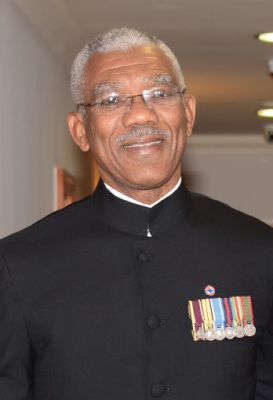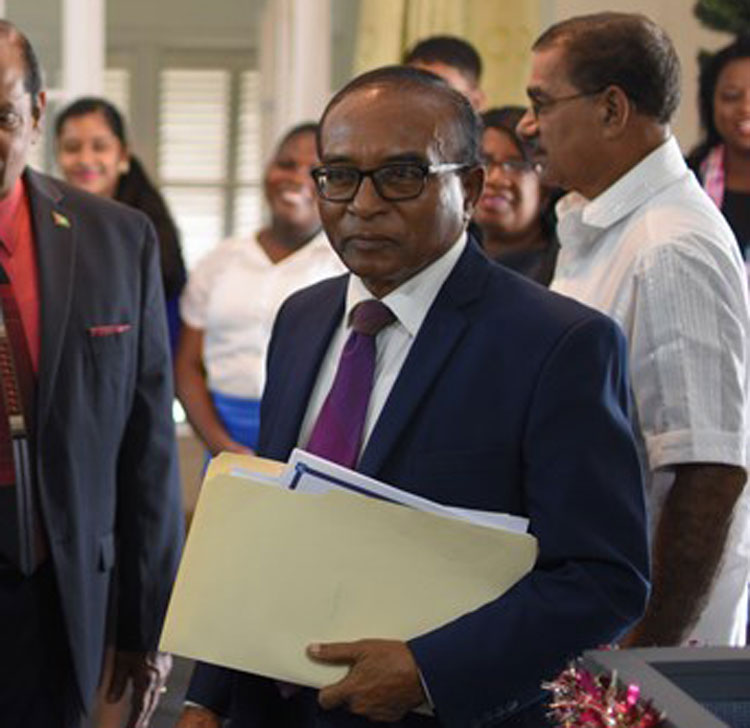While insisting that legal action will be taken against those public officials who have failed to file declarations of their assets and liabilities, Chairman of the Integrity Commission Kumar Doraisami says that he is unsure if President David Granger is non-compliant and will have to make checks to verify his status.
“Right now, I don’t know. I haven’t had a meeting recently. As of today, I can’t tell you…,” Doraisami told Sunday Stabroek when asked if the president has submitted his declaration. Granger publicly admitted almost two weeks ago that he was not in compliance with the Integrity Commission Act, which mandates holders of certain public offices to declare their assets and liabilities on or before June 30th of each year and that he was working to rectify the situation.
The head of the Transparency Institute of Guyana Inc. (TIGI) Dr Troy Thomas has said that the president’s non-compliance is inexcusable.
After numerous attempts over a two-week period, Sunday Stabroek was able to establish contact with Doraisami last Friday and he requested two weeks to get the answers to the questions this newspaper about the president and his submissions to the Commission.

When told about the concerns that Thomas raised, Doraisami said that he did not get an opportunity to read his comments.
“I am not aware of what he is saying really, so I can’t tell you anything,” he said. The Chairman, who was on his way to a Commonwealth conference at the time, indicated that when he returns later this week, he expected to have some more information.
Reminded of the president’s public admission, he said that the president hasn’t told him anything nor has he received any document that indicates that he has not declared.
Doraisami explained that he is in contact with the secretariat two to three times each week, “so when I talk to the people down there, when I consult the commissioners and so on, then we arrange for a meeting and we discuss these matters and whatever resolution we come to, we instruct the people in the secretariat to act accordingly. I wouldn’t be able to shed any light in respect of the president. Not at all,” he said.
Pressed on the fact that the president has admitted, Doraisami insisted, “He hasn’t told me that.” He later reiterated that when he returns from his trip abroad, he would be in a better position to answer questions on the state of the president’s declaration and the non-publication of his name among the defaulters who have already been publicly identified by the Commission.
Granger admitted late last month that he has not yet submitted all his declarations to the Commission but said that he is currently working to rectify the situation. “I have written to them [the Commission]. I have not submitted all of my declarations. They are taking some time but I am in touch with them and the Commission has heard from me,” he told reporters when asked if he had filed a declaration.
He would later say that he is concerned that some of his ministers have not complied even though it is the policy of the Cabinet.
The concerns raised by Thomas were two-fold: that the president was non-compliant and that his name was not published.
Heading the list of the specified offices published in Schedule 1 of the Act is the President of Guyana. Among the several dozen offices listed are Members of Parliament (MPs), the Director of Public Prosecutions (DPP) as well as the Deputy, presidential advisors, the Auditor General and the Deputy, the Commissioner of Police, the Chief of Staff of the Guyana Defence Force, the various service commissions, the Police Complaints Authority, Judges of the Supreme Court, Magistrates, the Vice Chancellor, Registrar and Deans of Faculties of the University of Guyana and members of the Integrity Commission.
The reconstituted Integrity Commission initially published a full-page notice of officials who had not complied with filing their declarations in the November 10th, 2018 edition of the Guyana Chronicle. Among the defaulters were 41 Members of Parliament (MPs), including senior government ministers, and opposition members, as well as the House Speaker.
The president’s name is not on that list or the six other lists that were published subsequently.
Thomas’ position was that regardless of who the official is, their name should be published if a declaration form was not submitted to the Commission.
He posited that it is expected that the president would lead by example. “The president has to make a better effort to make sure [he complies]. He can’t say anything about his Cabinet. He can’t compel them to comply because he is not in compliance… the president must understand that he has a key role to play in that Integrity Commission Act and if he does that [doesn’t comply] the whole thing falls apart,” Thomas said.
He also held firm to an earlier call for the legislation to be changed to allow for the President and Opposition Leader to have to make their declarations public.
Legal action coming
Meanwhile, Doraisami told Sunday Stabroek that on his return he will meet with the other commissioners and a date for the commencement of legal action against defaulters will be decided on.
“Yes, yes we have to do something. We are just waiting for confirmation of some other things,” he explained, while noting that the step after publication is legal action. He indicated that a team has to be “put together” as the file for each errant official has to be sent to the DPP for advice. “So it’s going to take some time but we are working on that but when I come back from the conference, we will have a meeting and then decide on the dates and so on.”
Doraisami said there is a Compliance/Legal officer on staff who is awaiting instructions on the way forward. “She hasn’t received that instruction yet but once we do that she will start putting the file… [and] the evidence together, starting from the time publication was done, telling the declarations that they have to declare. Then notices sent to them, then publications in the [Official Gazette] and the newspaper and so on. Once those preliminary steps are completed, then we will decide on the prosecution side of it,” he noted.
The Chairman pointed out that more lists will be published as the schedule has not been exhausted.
When asked why the Commission kept publishing more lists even though some of the officials remain non-compliant, he explained that the law required that the names of all errant officials are to be published before legal action can begin. He said legal action is also a matter of cost and getting legal advisors and the DPP involved. “It’s a lot of things involved. It’s not just signing a paper and getting it going. We have to get our evidence. We have to put everything together per person,” he noted.
Indicating that the rate of submission is still low, Doraisami said that some officials have complied almost immediately after their names are published in the newspaper.
He said given the fact that it was the first time that names were published in the newspaper by the Commission, people are beginning to understand the seriousness of their obligations and “it’s not like before when you can do as you please. They know that once their name is published, the next step is prosecution.”
He added that discussion with legal advisors and the careful construction of files is important as the Commission does not want to “put together a case and can’t win it. So it’s not a matter of taking them to court only, but to make sure you have a tight case.”
He further noted that most of the compliant officials who were asked for additional information, have provided same. The others are expected to do so shortly.
Meanwhile, Doraisami also disclosed that the Commission has taken steps to have the schedule amended to include other officers. He said this will have to be handled by the Prime Minister in the National Assembly. According to Doraisami, documents were sent to the Prime Minister and he has accepted that the process will take some time.
He said too that the Commission will also have to look at additional resources. There is need for about five prosecutors to assist the legal officer, accountants and investigators. He, however, said the hiring of these professionals depends on the availability of money as the intention is to pay them according to their qualifications and experience and not in line with the public service scale, which is below par. “We are asking for about two or three months more to really start kicking and once we get off the ground there will be some momentum built up and we will be moving,” he assured.






